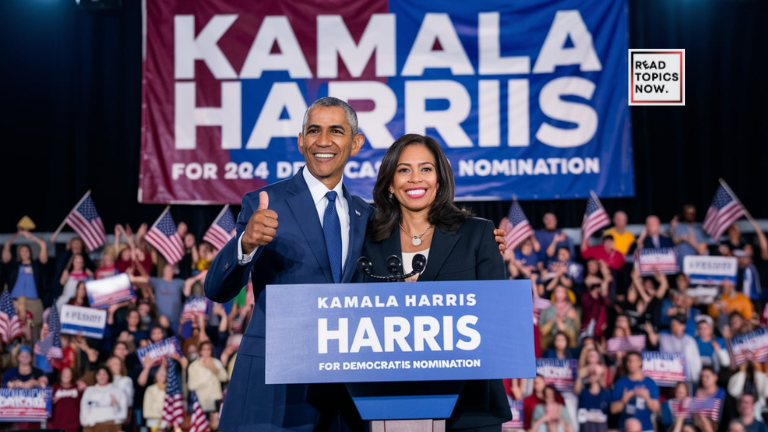
Obama's Endorsement of Kamala Harris: Impact on 2024 Democratic Nomination

Introduction
Barack Obama’s involvement in the 2024 Democratic primary has garnered significant attention, particularly his support for Vice President Kamala Harris following President Joe Biden’s withdrawal from the race. This article explores the dynamics of Obama’s endorsement, its implications for Harris’s campaign, and its potential impact on the Democratic Party.
Historical Context
Obama’s Role in Democratic Politics Post-Presidency
Since leaving office, Barack Obama has remained a pivotal figure in Democratic politics, offering endorsements and strategic support to key candidates. His influence extends beyond his presidency, shaping the party’s direction through his advocacy and public appearances.
Obama’s Previous Endorsements and Political Influence
Obama’s endorsements have historically carried significant weight, often swaying public opinion and boosting campaign momentum. His support in the 2020 primaries, though cautious, ultimately played a crucial role in Joe Biden securing the Democratic nomination.
Background on Kamala Harris’s Political Career
Kamala Harris, a former California Attorney General and U.S. Senator, has been a prominent figure in American politics for over a decade. Her career is marked by her work on criminal justice reform, healthcare, and civil rights, making her a formidable candidate for the presidency.
Obama and Harris’s Relationship
How Obama and Harris First Met
Obama and Harris first crossed paths during his early Senate days. Their relationship strengthened over time, especially during Obama’s presidency when Harris served as California’s Attorney General.
Key Interactions and Moments in Their Relationship
Notable moments in their relationship include Harris’s support for Obama’s policy initiatives and their collaborations on various political campaigns. These interactions have built a foundation of mutual respect and shared political values.
Harris’s Role in the Obama Administration
While Harris did not serve directly in Obama’s administration, her work as Attorney General aligned closely with Obama’s policy goals, particularly in areas like criminal justice reform and civil rights.
The Decision to Endorse
Factors Influencing Obama’s Decision to Endorse Harris
Obama’s decision was influenced by his long-standing relationship with Harris, her political potential, and the strategic benefits of endorsing a candidate who represents the future of the Democratic Party.
Timing and Strategic Considerations
Obama’s endorsement timing was strategic, allowing Harris to establish her campaign independently before stepping in to provide a significant boost. This approach aims to avoid the perception of a pre-determined succession while maximizing the impact of his support.
Reactions from Democratic Leaders and the Public
Democratic leaders have largely welcomed Obama’s endorsement, viewing it as a unifying force. Public reactions have been mixed, with some expressing enthusiasm and others skepticism, reflecting the diverse opinions within the party.
Biden’s Withdrawal
Reasons Behind Joe Biden’s Decision to Step Aside
Biden’s decision was driven by a combination of factors, including declining approval ratings, concerns about his age and health, and pressure from senior Democrats following a poor debate performance.
Influence of Senior Democratic Figures on Biden’s Decision
Senior figures like Nancy Pelosi played a critical role in convincing Biden to withdraw, emphasizing the need for new leadership to maintain the party’s competitiveness in the upcoming election.
Obama’s Communication with Biden Pre- and Post-Decision
Obama maintained regular communication with Biden during this period, offering support and counsel. This close contact underscores the deep personal and political bond between the two leaders.
Harris’s Campaign
Launch and Initial Reception of Harris’s Campaign
Harris’s campaign launch was met with considerable excitement, drawing attention for its focus on progressive policies and her strong record. Her campaign quickly gained momentum, positioning her as a leading contender.
Key Policies and Campaign Promises
Harris’s campaign emphasizes key issues such as healthcare reform, climate action, economic equity, and criminal justice reform. These policies resonate with a broad base of Democratic voters, aligning with the party’s progressive wing.
Public and Media Perception
The media has largely focused on Harris’s qualifications and her historic candidacy as the first female Vice President running for the presidency. Public perception is varied, with supporters highlighting her experience and detractors questioning her electability.
Endorsement Process
Behind-the-Scenes Discussions and Planning
The endorsement involved extensive behind-the-scenes discussions among Obama, Harris, and their respective teams. These conversations focused on the timing, messaging, and potential impact of the endorsement.
Statements and Public Announcements
Obama’s public endorsement was carefully crafted to highlight Harris’s strengths and her alignment with his vision for the country. The announcement was widely covered in the media, amplifying its reach and impact.
Impact of Obama’s Endorsement on Harris’s Campaign
Obama’s endorsement significantly boosted Harris’s campaign, enhancing her credibility and visibility. It provided a crucial momentum shift, helping to solidify her position as the front-runner in the Democratic primary.
Reactions to the Endorsement
Reactions from Democratic Party Members
Democratic Party members have generally reacted positively, seeing Obama’s endorsement as a unifying factor. It has helped consolidate support among key party factions and energize the base.
Republican Party and Opposition Responses
The Republican response has been predictably critical, framing the endorsement as indicative of Democratic establishment politics. Opposition voices have questioned Harris’s readiness and criticized Obama’s influence.
Public Opinion and Media Coverage
Media coverage has been extensive, analyzing the implications of the endorsement and its potential impact on the primary race. Public opinion is divided, reflecting broader political polarization.
Obama’s Political Strategy
Reasons for Delaying the Endorsement
Obama’s delay in endorsing Harris was strategic, allowing her to establish her campaign independently and avoiding the appearance of a coronation. This approach also gave Biden time to make his decision without additional pressure.
Historical Parallels to 2020 Election
Obama’s approach mirrors his strategy in the 2020 election, where he waited until the primary race had largely played out before endorsing Biden. This method aims to maintain party unity and respect the primary process.
Strategic Benefits and Risks
The strategic benefits of delaying the endorsement include increased campaign credibility for Harris and a more natural campaign progression. However, risks involve potential criticisms of indecisiveness or insufficient support for Harris.
Biden and Obama’s Relationship
Overview of Their Partnership During Obama’s Presidency
Biden and Obama’s partnership was characterized by a strong personal bond and mutual respect. Biden played a crucial role in the Obama administration, contributing to key policy decisions and providing a steadying influence.
Biden’s Role in Obama’s Administration
As Vice President, Biden was instrumental in shaping domestic and foreign policy, often serving as a liaison between the White House and Congress. His experience and expertise were invaluable assets to the administration.
Dynamics of Their Political Friendship
Their political friendship is built on trust, shared values, and a commitment to public service. This deep relationship has influenced their political decisions and public personas.
Democratic Party Dynamics
Influence of Senior Democrats like Nancy Pelosi
Senior Democrats like Nancy Pelosi have significant influence within the party, often shaping key decisions and strategies. Pelosi’s role in Biden’s withdrawal underscores her leadership and strategic acumen.
Role of Former Obama Aides in Biden’s Decision
Former Obama aides played a crucial role in advising Biden and orchestrating the transition to Harris’s campaign. Their involvement highlights the interconnectedness of Democratic leadership and the continuity of Obama’s influence.
Unity and Divisions Within the Party
The endorsement process and Biden’s withdrawal have exposed both unity and divisions within the Democratic Party. While Obama’s endorsement has helped unify key factions, underlying tensions and differing priorities remain.
Media and Public Perception
Coverage of Obama’s Delayed Endorsement
The media has closely scrutinized Obama’s delayed endorsement, analyzing its timing, motivations, and potential impact. This coverage has shaped public narratives and influenced perceptions of both Obama and Harris.
Public Narratives and Opinions
Public narratives around the endorsement vary, with some viewing it as a strategic masterstroke and others as a reluctant concession. These opinions reflect broader divisions within the electorate.
Media’s Role in Shaping the Political Landscape
The media plays a crucial role in shaping the political landscape, influencing public opinion and framing political events. Coverage of Obama’s endorsement has been pivotal in shaping perceptions of Harris’s campaign.
Future Implications
Potential Impact on the 2024 Democratic Primary
Obama’s endorsement is likely to have a significant impact on the 2024 Democratic primary, potentially solidifying Harris’s front-runner status and shaping the dynamics of the race.
Long-Term Effects on Democratic Party Unity
The endorsement may have long-term effects on Democratic Party unity, helping to bridge divides and foster a sense of collective purpose. However, it also risks exacerbating existing tensions if not managed carefully.
Prospects for Harris’s Presidential Bid
With Obama’s endorsement, Harris’s prospects for securing the Democratic nomination and potentially winning the presidency are greatly enhanced. However, she will need to navigate a challenging primary and general election landscape.
Expert Opinions
Political Analysts’ Views on the Endorsement
Political analysts have offered varied views on the endorsement, with some praising its strategic timing and others questioning its impact. Overall, the consensus is that Obama’s support is a significant boost for Harris’s campaign.
Predictions About Harris’s Chances of Winning the Nomination
Experts predict that Harris now has a strong chance of winning the Democratic nomination, though she faces formidable challenges from other candidates and the broader political environment.
Insights from Former Obama and Biden Aides
Former aides have provided insights into the endorsement process, emphasizing the strategic considerations and personal dynamics involved. Their perspectives highlight the complexity and significance of the decision.
Conclusion
Summary of Key Points
Obama’s endorsement of Kamala Harris marks a pivotal moment in the 2024 Democratic primary, offering a significant boost to her campaign and shaping the party’s future direction.
The Significance of Obama’s Endorsement for Harris
The endorsement underscores Obama’s continued influence in Democratic politics and his belief in Harris’s potential to lead the party and the country.
Future Outlook for Harris and the Democratic Party
Looking ahead, Harris’s campaign will need to build on this momentum, navigating the primary and general election challenges. The Democratic Party faces the task of maintaining unity and momentum in a highly competitive political landscape.
Get Curated Post Updates!
Sign up for my newsletter to see new photos, tips, and blog posts.






